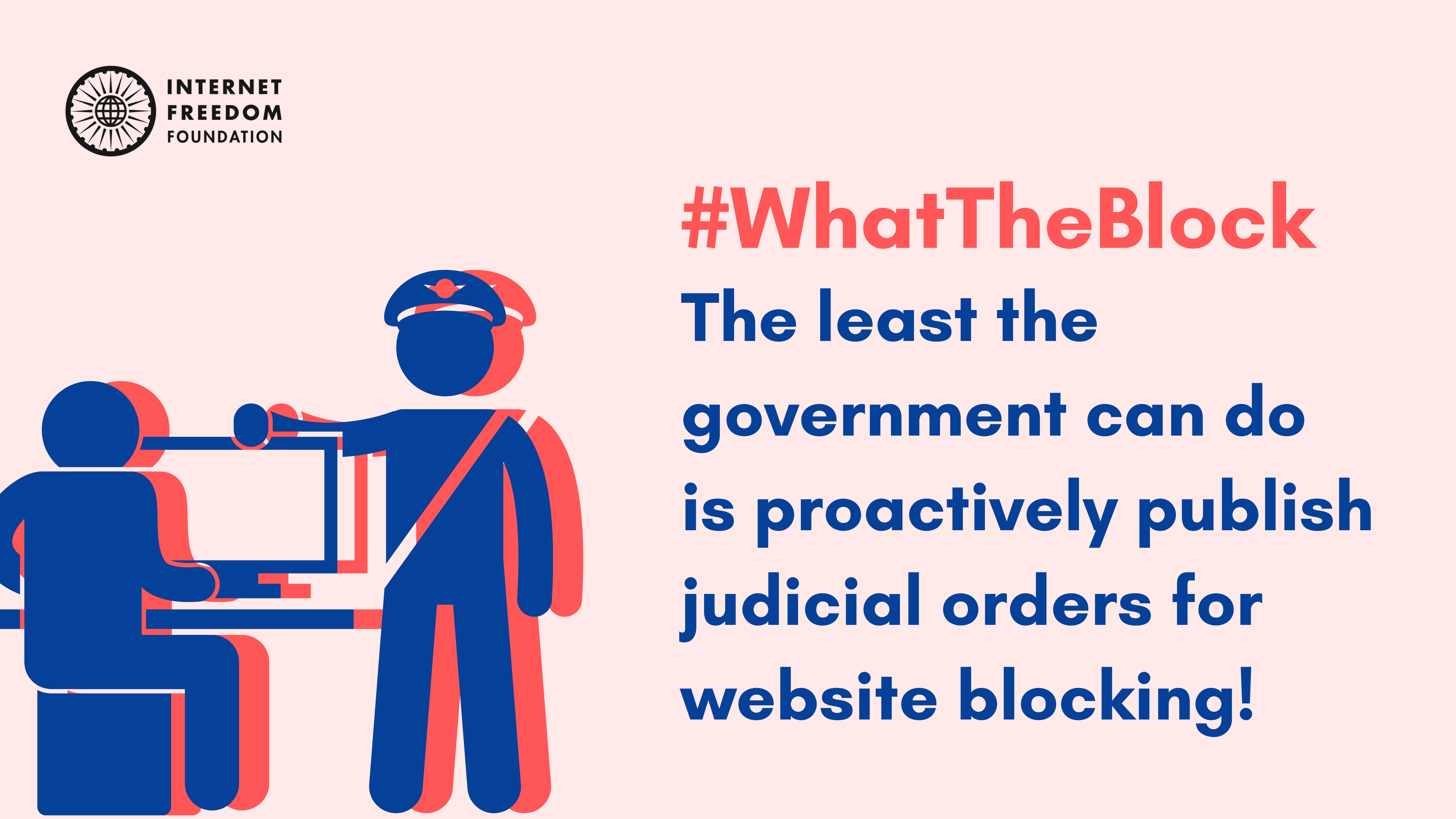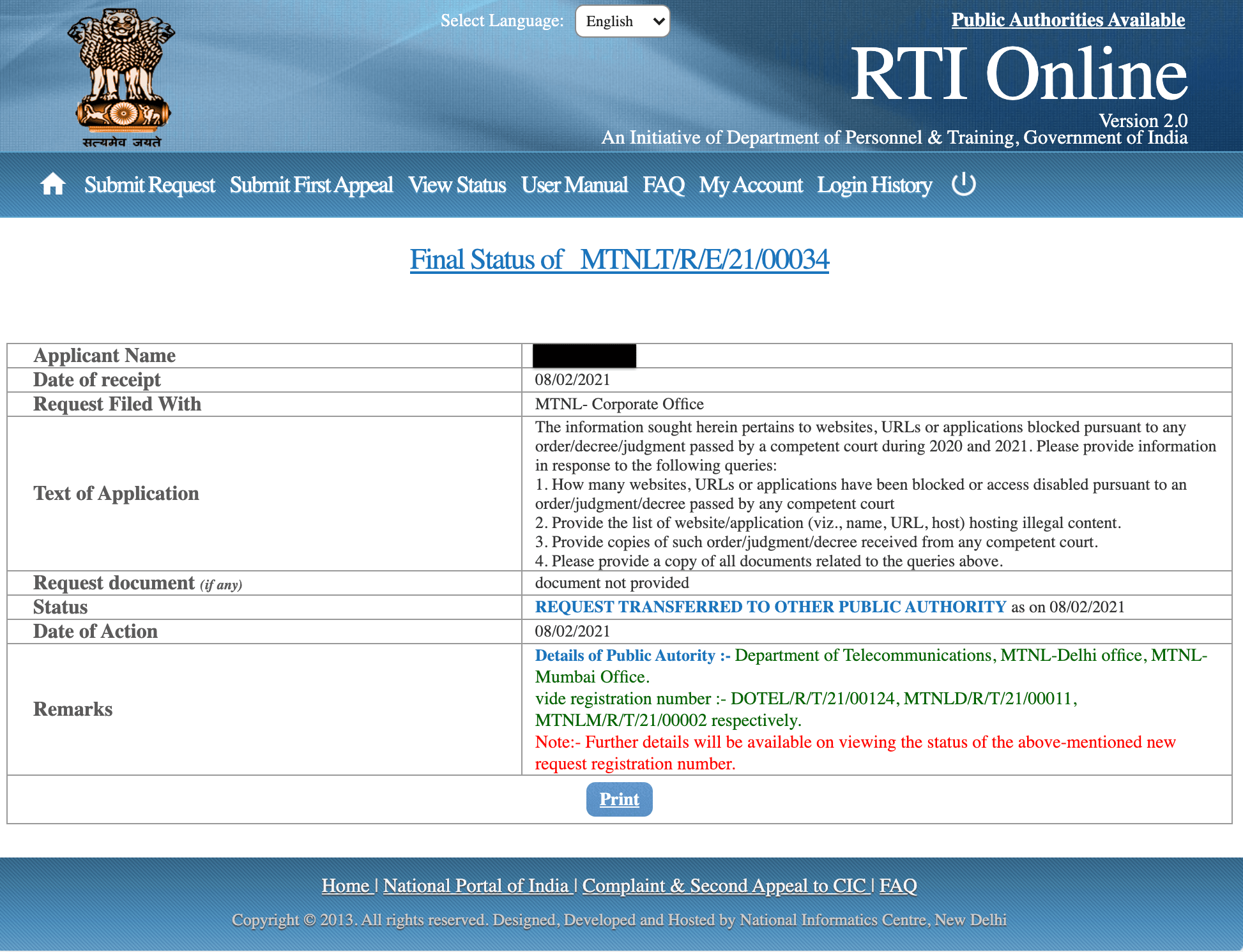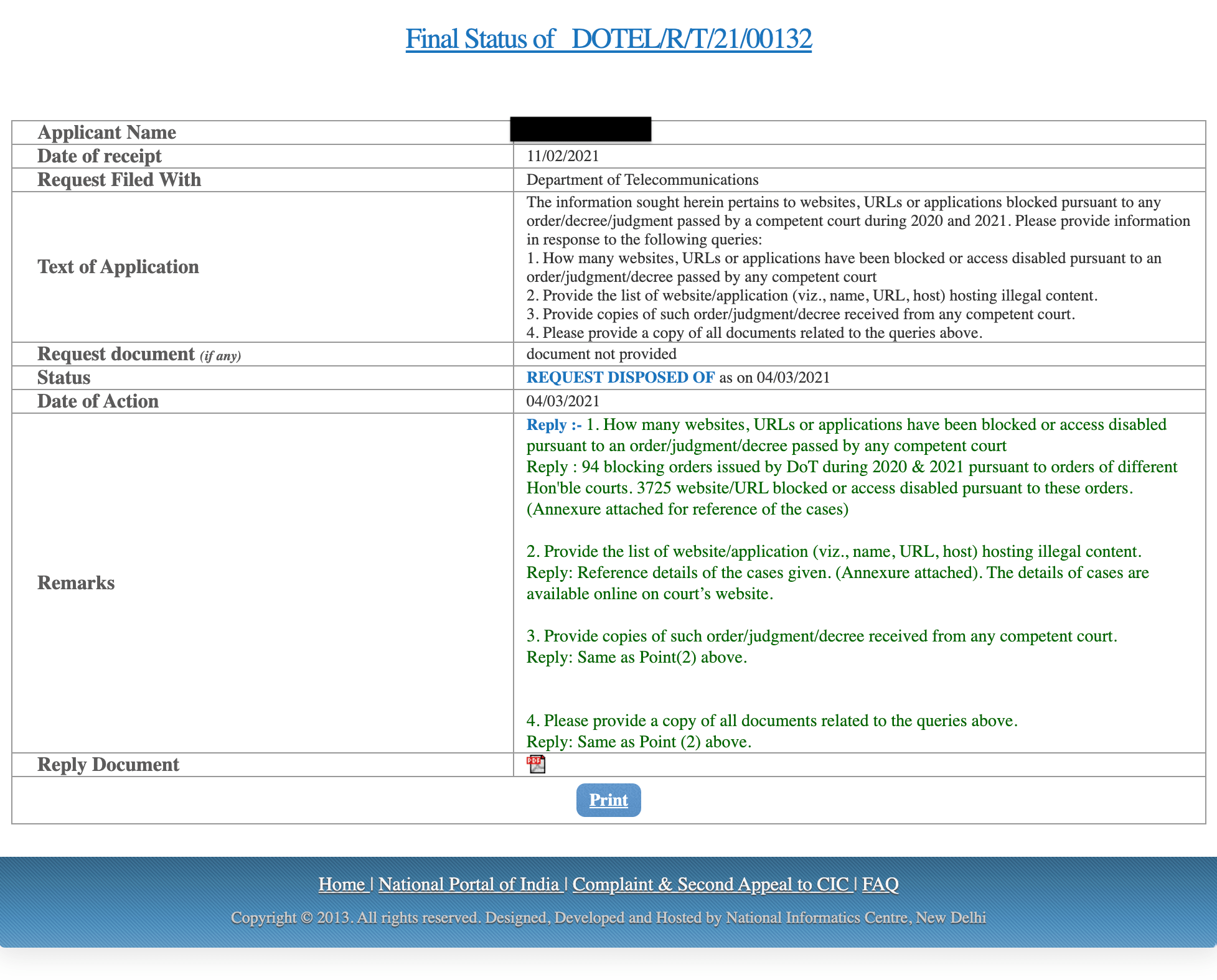
tl;dr
Through a Right to Information (RTI) request which was transferred to the Department of Telecommunication (DoT), we have been able to access a list of cases under which the DoT blocked websites pursuant to an order of a Court. This updates previous forms of data but given actual URLs were not provided it is deficient. In total, 94 blocking orders were issued by the DoT during 2020 & 2021 to block or disable access to 3725 websites/URLs. Given that making such requests and getting information is a time consuming process to further transparency we wrote to Ministry of Electronics and IT (MeitY) to, at the least, consider proactive publication of judicial orders and maintaining a public list of websites/URLs blocked under it.
What we found
On February 8, 2021, we filed a RTI request with MTNL asking them to provide us with information pertaining to websites, URLs or applications blocked pursuant to any order/decree/judgment passed by a competent court during 2020 and 2021.

Our request was further transferred from MTNL to DoT, from DoT to Director General (Telecom) HQ and finally from Director General (Telecom) HQ back to DoT.
In response to the transferred request bearing reference no. DOTEL/R/T/21/00132, the DoT provided a reply dated March 4, 2021. In their response, the DoT states that, "94 blocking orders issued by DoT during 2020 & 2021 pursuant to orders of different Hon'ble courts. 3725 website/URL blocked or access disabled pursuant to these orders." They also attached an annexure which contained the list of cases pursuant to which DoT issued these orders.

We also filed a First Appeal against this response, asking the First Appellate authority to direct the CPIO to share with us the specific court orders pursuant to which the blocking orders were issued.
Website blocking in India
In India, there are two sources of website blocking:
- Executive: A website can be blocked pursuant to directions of the Central Government under Section 69A of the Information Technology Act. This is usually done by the Ministry of Electronics and Information Technology (MeitY) and DoT. However, the Central Government cannot directly block websites for merely hosting pornographic content because obscenity or morality is not a ground for blocking websites under Section 69A of the IT Act. The DoT can also issue specific directions to Internet Service Providers (ISPs) under the Unified Access License to block websites in public interest (Clause 7.12) or to prevent transmission of obscene content (Clause 38.1). This follows the process as prescribed under the Blocking Rules, 2009 and as per the understanding of MeitY and DOT any such directions are confidential as per Rule 16. IFF is at present assisting a legal challenge to the lack of natural justice in this process.
- Judicial: A website may also be blocked pursuant to a court order. Many of them stem from claims of copyright infringement or defamation. Another additional category are PIL's on grounds of decency, morality and other group harms. After these court orders are passed they are sent to MeitY and the DoT for compliance under Rule 10 of the Blocking Rules, 2009. Such court orders along with the lists of URLs have historically been divulged as they are public information by MeitY but only after RTIs are filed. We have previously been provided access to court orders, however such practices are inconsistent.
So stemming from these two main branches the least the government can do is proactively take steps to provide transparency when websites are directed to be blocked as per court orders. We recently took action on it!
For public disclosure of court directed blocking
On April 9, 2021, we wrote to the DoT & MeitY requesting them to institute a proactive process for public disclosure of website blocking orders. We highlighted that the disclosure of court orders directing blocking of websites, URLs or applications is not barred under any existing provision and on the contrary there is precedent to the opposite. Disclosure of the applicable court order will not only ensure transparency and fairness, but also foster public trust in the public authorities that are constrained to block websites in accordance with law.
Since, MeitY is the nodal ministry as per the Allocation of Business Rules for the
implementation of the IT Act, 2000, putting into place a structure under which these orders can be proactively disclosed by MeitY will only demonstrate a commitment to transparency. This is also in consonance with the judgment of the Hon’ble Supreme Court in Shreya Singhal v. Union of India, (2013) 12 SCC 73 which stated that the requirement under Section 79(3)(b) of the Information Technology Act, 2000, as amended, to remove or disable access to information can only be pursuant to a court order and/or a request by the appropriate Government, and that such order must strictly conform to the subject matters laid down in Article 19(2) of the Constitution.
In this age of digital communication, protecting online speech has become extremely vital as it is used not only as a medium of expressing democratic opinion and this can only be done when reasons for blocking specific websites are made public in a proactive manner. Therefore, we made the following recommendations in our representation:
- That MeitY in coordination with DoT may institute a proactive process through an online portal for disclosures of website blocking orders.
- That when DoT and MeitY receive a court order requiring them to block a particular website, URL or application, a copy of the relevant court order be disclosed as well.
- That this disclosure be made on a quarterly basis to ensure transparency in the issuance of these orders as well as to ensure that over-broad censorship of online speech is curtailed.
Important Documents
- Representation to DoT & MeitY on disclosure of website blocking orders dated April 9, 2021 (link)
- A Tale of Rogue Pirates, Ashok Kumars and ISPs caught in the middle: RTI data on court ordered website blocking reveals worrying trends dated July 11, 2019 (link)
- Whistleblower provides blocking orders for over 4000 websites dated June 27, 2020 (link)

